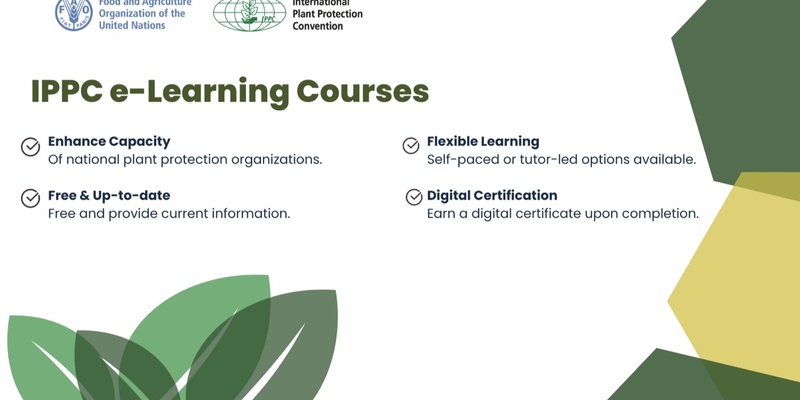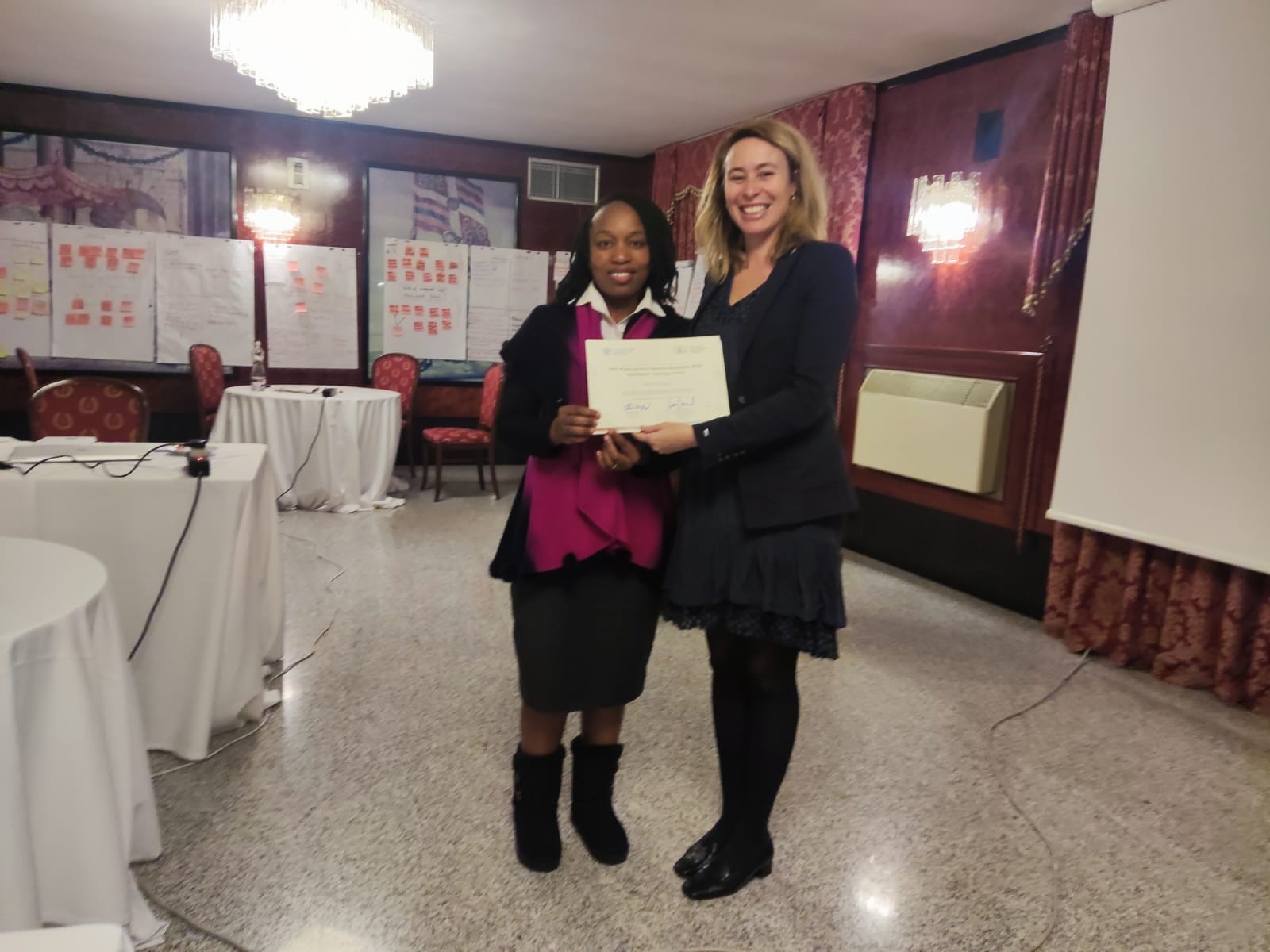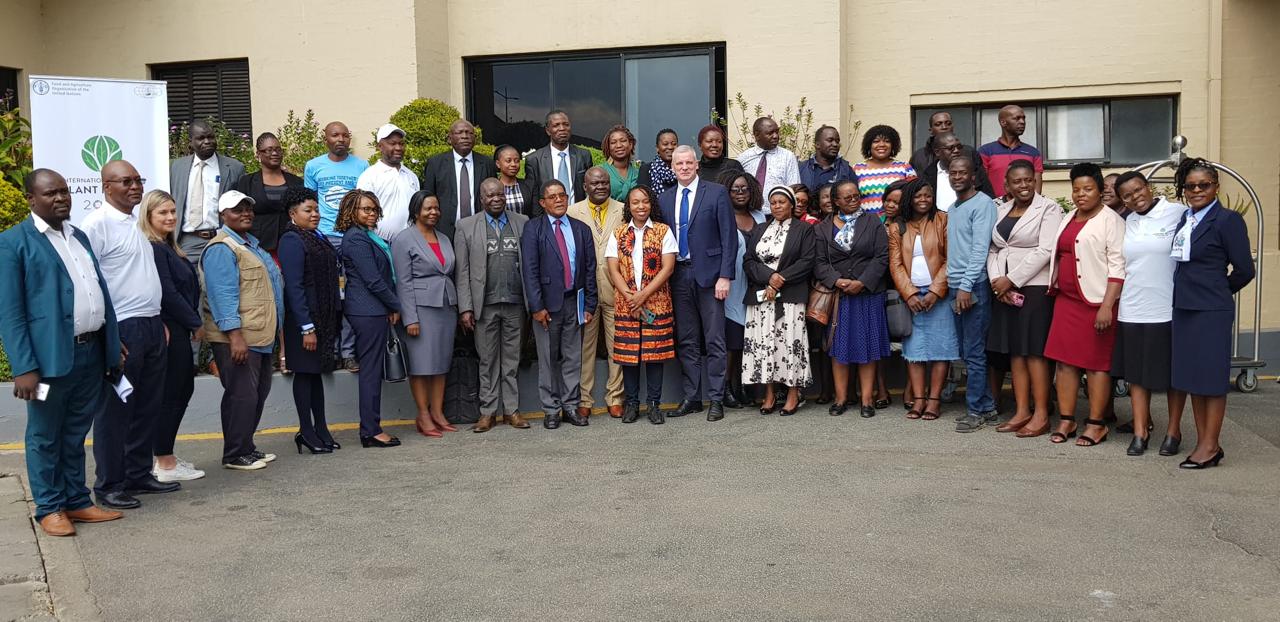Les formations en ligne de la CIPV au service de l’excellence phytosanitaire: témoignage de l’ONPV de Zambie
Posted on ven, 23 Aoû 2024, 11:22

Saviez-vous que l’une des missions du Secrétariat de la Convention internationale pour la protection des végétaux (CIPV), et plus particulièrement de l’Unité de la facilitation et de la mise en œuvre, consiste à élaborer du matériel de renforcement des capacités sur les grandes questions phytosanitaires? Saviez-vous également que ce matériel est gratuitement accessible à tous? Les guides et matériels de formation de la CIPV visent à aider les organisations nationales de la protection des végétaux (ONPV) à renforcer leurs capacités et à mettre en œuvre efficacement la Convention, les normes internationales pour les mesures phytosanitaires (NIMP) et les recommandations de la Commission des mesures phytosanitaires (CMP).
Un exemple en provenance de Zambie: comment les formations en ligne de la CIPV peuvent aider les responsables nationaux de la protection des végétaux dans leurs fonctions
Justina Chivanga, inspectrice phytosanitaire principale et responsable de l’Unité des normes et de la réglementation au sein de l’ONPV de Zambie – le Service de quarantaine végétale et des questions phytosanitaires –, a récemment fait part de son expérience en lien avec les formations en ligne de la CIPV.
Justina a commencé à suivre les cours en ligne de la CIPV dans le cadre de la formation rigoureuse qu’elle a suivie pour devenir facilitatrice certifiée de l’évaluation des capacités phytosanitaires (ECP). En suivant les cours de la CIPV sur l’analyse du risque phytosanitaire, sur la certification des exportations, sur la surveillance, sur les obligations nationales en matière de communication d’informations et sur l’inspection phytosanitaire, elle a acquis des connaissances approfondies qui ont été renforcées par une formation en présentiel de deux semaines. Pour devenir facilitatrice ECP certifiée, Justina a participé activement après sa formation à la mise en œuvre du processus d’ECP au Zimbabwe.
>   |
| Justina Chivanga (à gauche) reçoit son attestation de participation des mains de Sarah Brunel (à droite), responsable de l’Unité chargée de la facilitation de la mise en œuvre, à l’issue de la formation de facilitateur ECP. Mission d’ECP au Zimbabwe © FAO |
«Les formations en ligne de la CIPV ont profondément amélioré ma compréhension des concepts phytosanitaires essentiels, que j’ai pu appliquer concrètement lors de la mise en œuvre de l’ECP au Zimbabwe», explique Justina lorsqu’on lui demande de quelle manière les formations en ligne de la CIPV ont contribué à renforcer ses connaissances. «Au-delà de mon rôle de facilitatrice ECP, les connaissances que j’ai acquises grâce aux formations en ligne de la CIPV me sont d’une aide précieuse dans mes fonctions au sein de l’ONPV de Zambie. Ma compréhension de la CIPV et des normes internationales pour les mesures phytosanitaires (NIMP) dans le cadre de mes fonctions a été grandement facilitée par les formations en ligne», ajoute-t-elle.
Consciente de l’importance du contenu des formations en ligne et de leur conformité aux bonnes pratiques internationales, l’ONPV de Zambie commence à intégrer les formations en ligne de la CIPV dans le programme national de formation, qui s’adresse aussi bien aux nouvelles recrues qu’au personnel déjà en poste. Justina souligne que la facilité d’accès à ces cours est un grand avantage, car elle permet au personnel de l’ONPV de se tenir informé gratuitement des données les plus récentes et pertinentes. Elle ajoute que «le fait que ces cours soient accessibles à tous, que chacun puisse les suivre à son propre rythme, qu’ils soient gratuits, que l’on puisse y accéder à partir d’un téléphone portable et qu’un certificat soit délivré à l’issue de la formation est un avantage considérable en termes de formation continue».
Quelles sont les formations en ligne de la CIPV disponibles et comment y accéder? Les experts phytosanitaires souhaitant suivre les formations en ligne de la CIPV peuvent y accéder en consultant la page web consacrée aux guides et matériels de formation de la CIPV. Élaborées par le Comité chargé de la mise en œuvre et du renforcement des capacités dans le cadre du projet de facilitation des échanges du COMESA, les formations en ligne sont le fruit de la collaboration et de la contribution d’experts internationaux dans chacun des domaines concernés. Les participants aux cours sont ainsi assurés de bénéficier des informations les plus récentes et les plus pertinentes au niveau international.
Les formations actuellement proposées portent sur les obligations nationales en matière de communication d’informations, sur la surveillance et la détermination de la situation des organismes nuisibles, sur l’analyse du risque phytosanitaire (ARP), sur le système de certification phytosanitaire à l’exportation et sur l’inspection phytosanitaire. Ces cours ont été élaborés en partenariat avec le Pôle de formation en ligne de la FAO et le COLEAD, ce qui garantit un contenu de haute qualité conforme aux normes internationales. Le Secrétariat de la CIPV travaille actuellement à la traduction des formations en ligne de la CIPV dans d’autres langues officielles de l’ONU, ainsi qu’à l’élaboration de plusieurs nouvelles formations en ligne à paraître en 2025. Le Secrétariat de la CIPV recherche régulièrement des exemples et des études de cas sur la façon dont les ONPV intègrent les formations en ligne de la CIPV dans leur programme national de formation. Si vous souhaitez que l’action de votre ONPV soit présentée dans nos prochains articles, veuillez contacter le Secrétariat de la CIPV à l’adresse [email protected].
Informations complémentaires:

